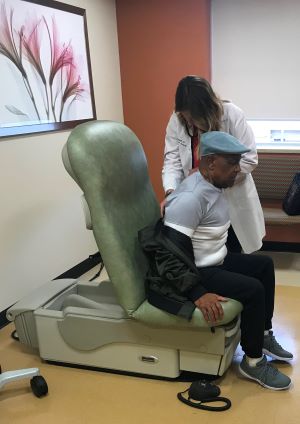Patient Puts Faith in Minimally Invasive Procedure
Sylvester T. Davis, 87, of Flint, always had regular checkups with his doctors over the years. When his wife started having heart problems, she encouraged him to get his heart checked out, as well. After she passed away from complications with her heart, Davis knew he had to remain vigilant with his checkups.
"It was just a routine checkup last fall when I found out my arteries were clogged and my aortic valve was not working properly," said Davis. "After another checkup, the doctor said my valve was getting worse and that it was time to consider valve replacement, possibly surgery. Besides my heart issues, I have always been in great health. I never drank or smoked, and have lived a healthy lifestyle, so the need for surgery came as a bit of a surprise to me."
Due to his faith, Davis did not consider surgery. He was worried about blood loss and the need for transfusion, so open-heart surgery was not an option for him. Little did he know, advanced technology would provide an option for him. Davis qualified for a procedure called transcatheter aortic valve replacement, also known as TAVR. Although it is not a new procedure, TAVR recently became approved by the Centers for Medicare and Medicaid Services (CMS) for low-risk patients experiencing aortic valve disease. Davis was considered low-risk since he did not have any other major health issues.
"For several years TAVR has been an FDA-approved, minimally invasive procedure for patients considered high-risk for open-heart valve-replacement surgery," said Ahmad Munir, MD, a structural heart specialist at McLaren Flint. "The CMS approval is wonderful news for so many more patients who can benefit from TAVR. The procedure is performed through a small puncture in the groin or a small incision in the chest. The cardiac team inserts an artificial tissue valve, which is folded and then placed in a delivery catheter into the larger artery of the groin. Using X-ray views, it is then eased up to the heart, unfolded and implanted at the site of the damaged valve, pushing it aside and taking over its function."
The McLaren Heart Valve Institute has a multi-disciplinary team who work with each patient on an individual basis. The clinical staff works with patients to come up with a treatment plan that respects their beliefs and personal preferences. With advancements in technology, there are more minimally invasive treatment options than at any other time in the past.
"When Dr. Munir told me I qualified for the minimally invasive low-risk TAVR procedure, I was happy to have the option to not be cut open, so I decided it was a good thing to have," said Davis.
In late October 2019, Davis returned to McLaren Flint for his post-procedure test and evaluation. His breathing improved greatly after his surgery and is overall doing much better.
"I usually do simple things but would really like to take a couple of trips. I have never seen the Grand Canyon, so that is a trip I want to take. My wife and I used to drive to Canada to see Niagara Falls, so I'd like to go there again for sure."
For more information about McLaren Flint's cardiac services go to mclaren.org/flintheart.

Pictured are aortic valve replacement patient Sylvester T. Davis of Flint and Leslie Clason, nurse practitioner, with the McLaren Heart Valve Institute.